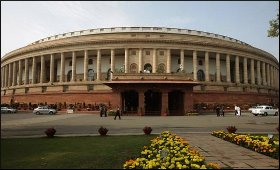|

|
GST bill tabled in Lok Sabha
|
|

|
|
| Top Stories |
 |
|
|
|
SME Times News Bureau | 20 Dec, 2014
The government Friday initiated legislation for the much awaited reform of the indirect tax system by tabling the Goods and Services Tax (GST) Bill in the Lok Sabha.
Finance Minister Arun Jaitley introduced the constitutional amendment bill for implementing the GST saying the objective of the legislation is "the seamless transfer of goods and services across the country".
Describing it as the single most important tax reform since 1947, he said the bill will be taken up for discussion in the next session of parliament.
The proposed tax reform would be a "win-win" situation for both state and central governments, he added.
"GST will be a win-win situation for both state and centre. GST will be the single most important tax reform, with potential to convert entire country into a single market, and avoid taxation over taxation," he said.
The GST proposes a national sales tax that will replace a myriad of overlapping state duties that deter investment.
Emphasising that he wanted the bill to be debated so that suggestions can be taken into account, the finance minister said that he had on Friday achieved a "near consensus" with the Empowered Committee (EC) of State Finance Ministers on GST in a meeting here.
"This is not a partisan legislation. We will ensure that the interest of every state is taken care of, that no state will lose a rupee of revenue," Jaitley said.
GST reform would strengthen the principle of "co-operative federalism" as the central and state governments would need to work together to take decisions which would require 75 percent majority approval in the GST Council.
"In the meeting I had with the states, they were not divided on political lines. They wanted comfort on centre-state relations. This marks a high point of Indian federalism," Jaitley told the media post-introduction of the bill.
The previous United Progressive Alliance (UPA) government had in 2011 introduced a Constitution Amendment Bill in the Lok Sabha towards the introduction of the GST. States sought a five-year compensation package and asked for its inclusion in the bill.
Jaitley told the house that states will receive Rs.11,000 crore this fiscal towards partial compensation of the losses suffered by them for reduction in central sales tax (CST).
While the CST is levied by the central government on inter-state movement of goods and collected by states, the issue of compensation arose because the central government cut the CST from 4 percent to 2 percent in phases, after state-level VAT was introduced from April 1, 2005.
The Cabinet Committee on Economic Affairs Wednesday approved the Goods and Services Tax (GST) Bill paving the way for its tabling.
Earlier, finance ministers of seven states in a meeting here Thursday rejected the draft Goods and Services Tax (GST) Bill, saying it does not address their concerns on the issues of compensation, entry tax, and the tax on petroleum products.
The states also want petroleum, alcohol and tobacco to be kept out of the purview of the GST.
Seen as a key to facilitating industrial growth and improving the business climate in the country, the GST bill needs to be passed by a two-thirds majority in both houses of parliament and by the legislatures of half of the states to become a law.
By subsuming most indirect taxes levied by the central and state governments such as excise duty, service tax, VAT and sales tax, GST proposes to facilitate a common market across the country, leading to economies of scale and reducing inflation through an efficient supply chain.
Full implementation of GST could lift India's gross domestic product (GDP) growth by 0.9-1.7 percentage points, according to a study by the National Council of Applied Economic Research (NCAER).
Commenting on the development, Sachin Menon, chief operating officer of KPMG India, said: "This is a moment in history, a turning point in India's history of fiscal reforms and all the architects who worked for bringing in GST since 2006 would remembered for their contribution to the nation."
|
|
|
| |
|
|
|
|
|
|
|
|
|
|
|
|
|
|
| |
| Customs Exchange Rates |
| Currency |
Import |
Export |
US Dollar
|
66.20
|
64.50 |
UK Pound
|
87.50
|
84.65 |
Euro
|
78.25
|
75.65 |
| Japanese
Yen |
58.85 |
56.85 |
| As on 13 Aug, 2022 |
|
|
| Daily Poll |
 |
 |
| PM Modi's recent US visit to redefine India-US bilateral relations |
|
|
|
|
|
| Commented Stories |
 |
|
|
|
|
|
| |
|